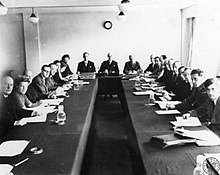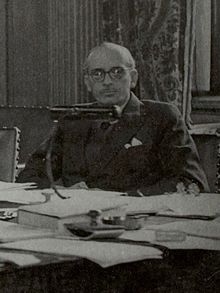United Nations War Crimes Commission
United Nations War Crimes Commission | |
|---|---|
| History | |
| Founded | October 20, 1943 |
| Disbanded | 1948 |
The United Nations War Crimes Commission (UNWCC) initially called the United Nations Commission for the Investigation of War Crimes, was a commission of the United Nations that investigated allegations of war crimes committed by Nazi Germany and the other Axis powers in World War II.[1]
History

The Commission was constituted at the behest of the British government[2] and the other sixteen Allied nations at a meeting held at the British Foreign Office in London on 20th October, 1943,[3] prior to the formal establishment of the United Nations in 1945.[4]
The proposal of its establishment was made by the Lord Chancellor John Simon in the House of Lords on 7 October, 1942. A similar statement was issued by the United States government.[5]
The proposal is to set up with the least possible delay a United Nations Commission for the Investigation of War Crimes.
The Commission will be composed of nationals of the United Nations, selected by their Governments. The Commission will investigate war crimes committed against nationals of the United Nations recording the testimony available, and the Commission will report from time to time to the Governments of those nations cases in which such crimes appear to have been committed, naming and identifying wherever possible the persons responsible. The Commission should direct its attention in particular to organized atrocities. Atrocities perpetrated by or on the orders of Germany in Occupied France should be included.
The investigation should cover war crimes of offenders irrespective of rank, and the aim will be to collect material, supported wherever possible by depositions or by other documents, to establish such crimes, especially where they are systematically perpetrated, and to name and identify those responsible for their perpetration.
— Lord Chancellor John Simon at the House of Lords on 7 October, 1942.
The Commission's objects and powers were conferred as follows:
- It should investigate and record the evidence of war crimes, identifying where possible the individuals responsible.
- It should report to the Governments concerned cases in which it appeared that adequate evidence might be expected to be forthcoming.

One of the Commission's tasks was to carefully collect evidence of war crimes for the
before being dissolved in 1949.According to British academic Dan Plesch, Adolf Hitler was put on the UNWCC's first list of war criminals in December 1944, after determining that Hitler could be held criminally responsible for the acts of the Nazis in occupied countries. By March 1945, a month before Hitler's death, "the commission had endorsed at least seven separate indictments against him for war crimes."[8]
However limited its powers, the creation of the commission was a landmark in the history of human justice in the field of international law.

See also
References
Citations
- ISBN 978-0-521-83432-2.
- ^ Effie Pedaliu (2004). Britain and the 'Hand-over' of Italian War Criminals to Yugoslavia, 1945-48. (JStor.org preview) Journal of Contemporary History. Vol. 39, No. 4, Special Issue: Collective Memory, pp. 503-529
- ISSN 0002-9300.
- ISBN 978-0-313-31386-8.
- ^ Franklin D. Roosevelt: "Statement on the Plan to Try Nazi War Criminals.," October 7, 1942.
- ISBN 978-1-886363-91-5.
- ^ "Out of the 'darkness': UN War Crimes Commission records hailed as vital international justice tool". 11 November 2014.
- ^ Daniel Plesch 2017, p. 158.
- ^ "E/CN.4/W.19". UN.org.
- ^ Ruhashyankiko, Nicodème (1978). "Study of the question of the prevention and punishment of the crime of genocide". Retrieved 08 November 2022 – via Digital Library.
- ^ Whitaker, Benjamin (1985). "Revised and updated report on the question of the prevention and punishment of the crime of genocide / prepared by B. Whitaker.". Retrieved 08 November 2022 – via Digital Library.
- ^ ISBN 978-1-13-831885-4.
Sources
- Kochavi, Arieh J. (1998). Prelude to Nuremberg. University of North Carolina Press. ISBN 0-8078-2433-X.
- Daniel Plesch (2017). Human Rights After Hitler: The Lost History of Prosecuting Axis War Crimes. Georgetown University Press. ISBN 978-1-62616-431-4.
- Kochavi, Arieh J. (1992). "Britain and the Establishment of the United Nations War Crimes Commission". The English Historical Review. 107 (423): 323–349. JSTOR 575067.
- Fleming, Michael (2022). In the Shadow of the Holocaust: Poland, the United Nations War Crimes Commission, and the Search for Justice. Cambridge: Cambridge University Press. ISBN 9781009098984.
External links
- Records of the United Nations War Crimes Commission (UNWCC) (1943-1949) at the United Nations Archives
